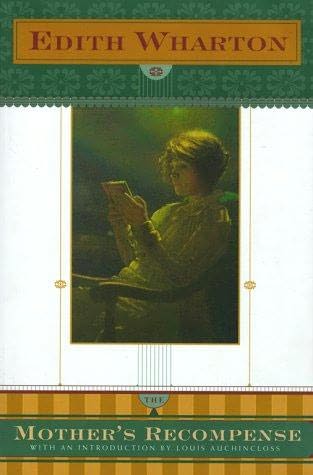This novel by Edith Wharton (The Age of Innocence, Ethan Frome) is concerned with the act of expatriation and how strange one can find their old country upon returning to it. This is especially true when the country is America at the turn of the 20th century. Oh, and I guess a vaguely-incestual love triangle would likewise complicate the homecoming. Of interest stylistically is the sparse use of psychonarration.
"Everything in her mind was hot and cold..."
"'It must,' she thought, 'be a little like the way the gravestones will behave on the Day of Judgment.'"
"Life still dated for her from that day--in spite of the way he had hurt her, of his having inflicted on her the bitterest pain she had ever suffered, he had yet given her more than he could take away."
"But gradually it came over her that to feel alone was not in the least what she wanted. She had never, for years at any rate, been able to bear it for long; the crowd, formerly a solace and an escape, had become a habit, and being face to face with her own thoughts was like facing a stranger."
"Yes: the war had brought them peace, strange and horrible as it was to think it."
"The overwhelming changes had all happened, in a whirl, during the years of her absence; and meanwhile she had been living in quiet backwaters, or in the steady European capitals where renewals make so little mark on the unyielding surface of the past."
"The war had swallowed her up, her and all her little concerns, as it had engulfed so many million others. It seemed written that, till the end, he should have to be thankful for the war."
"But the young people--what did they think? That would be the interesting thing to know. They had all, she gathered, far more interests and ideas than had scantily furnished her own youth, but all so broken up, scattered, and perpetually interrupted by the strenuous labour of their endless forms of sport, that they reminded her of a band of young entomologists, equipped with the newest thing in nets, but in far too great a hurry ever to catch anything. Yet perhaps it seemed so only to the slower motions of middle-age."
"'I hate talking. I only like noises that don't mean anything.'"
"The truth came to her, after that first evening, with the surprised discovery that the family had refrained from touching on her past not so much from prudery, or discretion even, as because such retrogressions were jolting uncomfortable affairs, and the line of least resistance flowed forward, not back."
"'I suppose I'm old-fashioned. Nothing shocks the young people nowadays--not even the Bible."
"It was evidently her pride to be perpetually invited, perpetually swamped in a multiplicity of boring engagements."
"'Life, for her, wherever she is, consists in going somewhere else in order to do exactly the same thing.'"
"They continued to stand facing each other, their inspiration spent, as if waiting for the accident that had swept them together to whirl them apart again."
"What did she know of any one of them? Nothing more, she now understood, than their glazed and impenetrable surfaces."
"'How can anybody love one day, and not the next?'"
"Her question seemed to drop into the silence like a shout; as if she had let fall a platter of brass on a marble floor."
"Who had suffered most the previous evening, he or she?"
"'The thing in the world I'm most afraid of is sterile pain,' he said after a moment. 'I should never want any one to be the cause of that.'"
"What a help it must be to turn to somebody who could tell one firmly, positively what to do--to be able to lay down one's moral torture like a heavy load at the end of the day!"
"She reflected with self-derision that all her suicidal impulses seemed to end in the same way; by landing her in the arms of some man she didn't care for."
"It was curious, in what neatly recurring patterns events often worked themselves out."
"Yes; it was true; she knew it herself: she had to go on cramming things into her days, things good, bad or indifferent, it hardly mattered which as long as they were crammed tight enough to leave no chinks for backward glances."
"'Never is a long word.'"
9/28/07
The Mother's Recompense
at
9/28/2007
![]()
Subscribe to:
Post Comments (Atom)
No comments:
Post a Comment